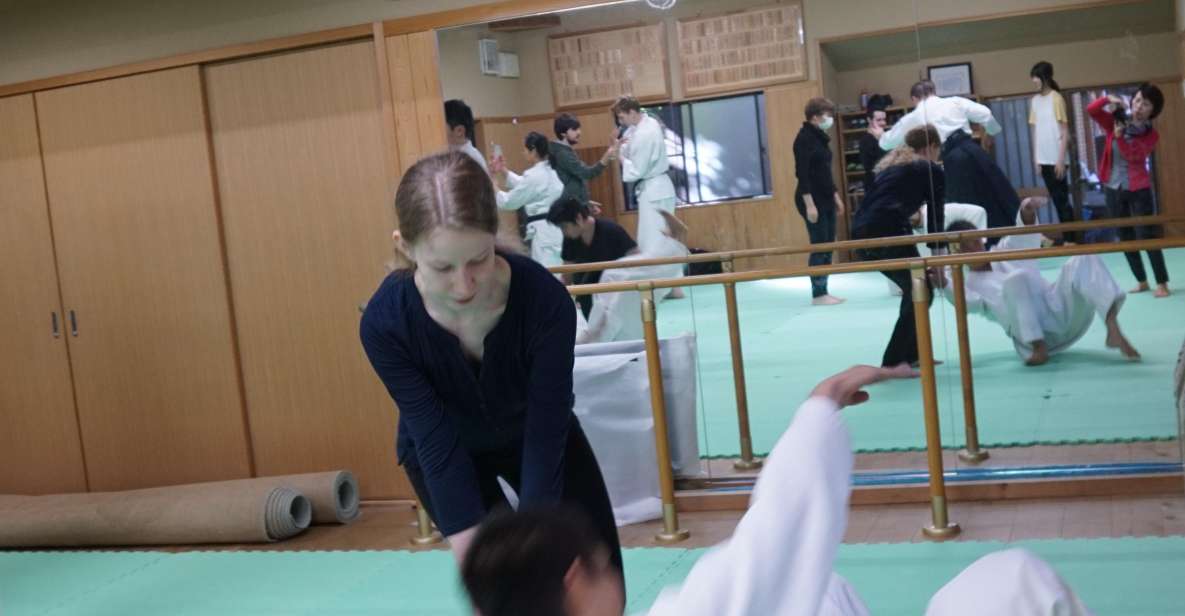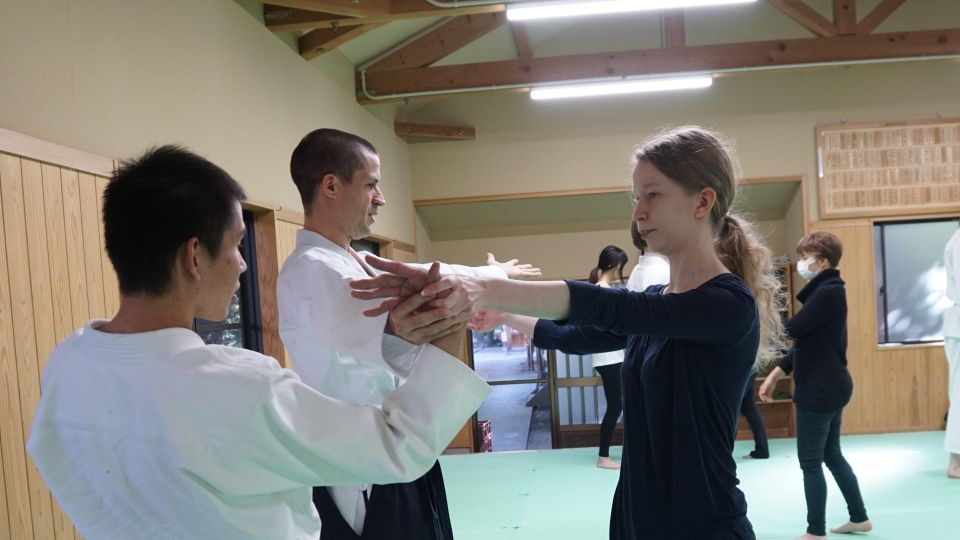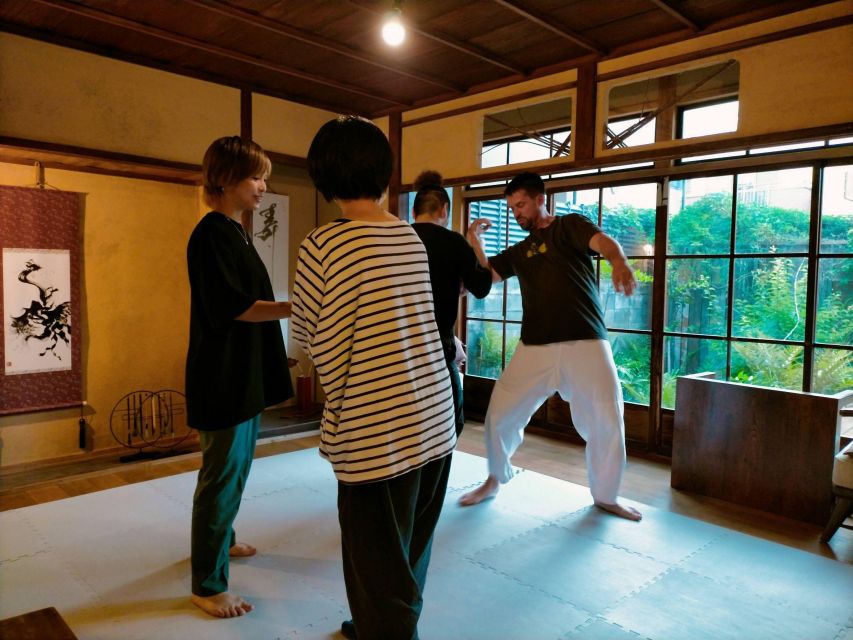In a small dojo tucked away in the heart of Tokyo, a young woman finds herself intrigued by the graceful movements and seemingly effortless techniques of Aikido practitioners. As she observes the fluidity and precision of their actions, she begins to question the underlying philosophy that guides this martial art.
Aikido, often misunderstood as merely a physical practice, holds within its core principles a profound wisdom that extends far beyond the realm of combat. Through an exploration of its origins, principles, and modern applications, one can uncover a rich tapestry of tradition and innovation that continues to captivate practitioners worldwide.
Just The Basics

- Aikido focuses on harmonizing with opponents and restoring peace through non-aggressive techniques.
- Rooted in spiritual teachings, Aikido emphasizes conflict resolution, mindfulness, and personal development.
- Training in Aikido develops balance, resilience, and awareness for practitioners in daily interactions.
- Aikido’s principles extend beyond self-defense, promoting harmony, non-violence, and transformative conflict resolution.
Here's some other great tours and experiences nearby we think you'll like.
Origins of Aikido

The roots of Aikido can be traced back to the early 20th century in Japan, evolving from the martial art practices of its founder, Morihei Ueshiba. Cultural influences, such as Ueshiba’s background in spiritual and philosophical teachings, significantly shaped the development of Aikido. Ueshiba’s exposure to various martial arts, including Daito-ryu Aiki-Jujutsu, also played a crucial role in shaping the principles of Aikido.
His vision was to create an art that focused on self-improvement, harmony, and non-violence. The global spread of Aikido can be attributed to Ueshiba’s dedicated students who traveled worldwide to teach the art. The training methods in Aikido emphasize blending with an opponent’s energy, redirecting attacks, and using circular movements for defense, reflecting the founder’s holistic approach to martial arts.
Principles of Aikido
Aikido’s foundational principles center around harmonizing with an opponent’s energy to redirect and neutralize attacks efficiently. This martial art emphasizes mindfulness, balance, and harmony in both physical and mental aspects.
-
Aikido principles: The core of Aikido lies in blending with an attacker’s movements rather than meeting force with force, promoting a non-confrontational approach.
-
Mindfulness: Practitioners are encouraged to be fully present in the moment, aware of their surroundings, and focused on the task at hand to respond effectively.
-
Balance and harmony: Aikido techniques aim to restore equilibrium, not only in combat situations but also in daily interactions, fostering a sense of peace and unity.
Techniques in Aikido

Exploring the intricate art of Aikido unveils a dynamic array of techniques designed to redirect and neutralize an opponent’s energy with fluidity and precision. Aikido practitioners employ a combination of throws, joint locks, and pins to subdue attackers efficiently. These techniques require a deep understanding of body mechanics and timing to execute effectively. Advanced techniques in Aikido explore more complex movements and responses, challenging practitioners to refine their skills continually. Practical applications of Aikido techniques extend beyond self-defense scenarios, emphasizing harmony and non-aggression in resolving conflicts. By mastering these techniques, practitioners not only enhance their physical prowess but also cultivate a mindset of peace and cooperation.
| Techniques | Description | Benefits |
|---|---|---|
| Throws | Redirecting an opponent’s energy through throws | Develops balance and timing |
| Joint Locks | Controlling an attacker through joint manipulation | Subdues without causing harm |
| Pins | Immobilizing an opponent on the ground | Creates opportunity for control |
Philosophy Behind Aikido
Rooted in principles of harmony and non-resistance, Aikido’s philosophy embodies a transformative approach to conflict resolution and personal development.
The spiritual aspect of Aikido delves into connecting with the energy flow of the universe, emphasizing unity and empathy. This martial art encourages practitioners to view conflict not as a battle to be won but as an opportunity for growth and understanding.
The training mindset in Aikido revolves around cultivating a calm and focused demeanor, promoting mindfulness and adaptability in the face of challenges. Through Aikido, individuals learn to redirect aggressive energy harmoniously, reflecting the art’s core belief in peaceful conflict resolution.
This philosophy extends beyond the dojo, influencing practitioners to approach life with grace and resilience.
Training in Aikido
Embodying the principles of harmony and non-resistance, training in Aikido focuses on cultivating a transformative approach to conflict resolution and personal development through practical techniques and philosophical insights. Aikido techniques emphasize blending with an opponent’s energy rather than meeting force with force, redirecting attacks with fluid movements that aim to neutralize aggression without causing harm. Practitioners learn to use an attacker’s momentum against them, promoting a harmonious resolution to conflicts.
This martial art’s philosophy extends beyond physical self-defense, encouraging practitioners to apply its principles of harmony and non-violence to daily interactions and personal growth. By honing both physical and mental discipline through training in Aikido, individuals develop a greater sense of balance, resilience, and awareness in various aspects of their lives.
Benefits of Aikido Practice
By practicing Aikido, you can cultivate a unique blend of physical and mental discipline that fosters harmony, resilience, and heightened awareness in various aspects of their lives. Aikido practice offers a range of benefits that contribute to overall well-being and personal growth.
- Physical Wellness: Aikido enhances physical fitness through dynamic movements, improving strength, flexibility, and coordination.
- Mental Clarity: The practice of Aikido promotes mental focus, concentration, and stress relief, leading to a calmer and more centered mindset.
- Emotional Balance: Aikido helps practitioners develop emotional intelligence, self-control, and empathy, fostering healthier relationships and conflict resolution skills.
These combined effects empower individuals to navigate life’s challenges with greater ease and resilience, both on and off the mat.
Aikido in Modern Times
In the contemporary landscape, Aikido continues to evolve as a dynamic martial art practice that adapts to the challenges of modern times. This evolution is evident in the way Aikido has maintained its traditional roots while also integrating contemporary self-defense strategies and principles.
The popularity of Aikido practice has grown steadily, attracting individuals seeking a holistic approach to martial arts that emphasizes harmony, fluidity, and effective non-violent resolution of conflicts. Aikido’s focus on redirecting an opponent’s energy rather than meeting force with force resonates with many practitioners looking for a martial art that can be applied not only in physical confrontations but also in everyday interactions.
As Aikido evolves, its enduring philosophy of blending with and transcending opposition continues to inspire and engage martial artists worldwide.
Finding Aikido Classes
Seeking Aikido classes can be a rewarding journey for those interested in delving into the art of harmonious martial practices. When looking for Aikido classes, individuals should consider the following aspects:
-
Class Schedules: Finding classes that fit one’s availability is crucial for consistent practice and progress.
-
Instructor Qualifications: Ensuring instructors are qualified, experienced, and hold relevant certifications can enhance the learning experience.
-
Facility Atmosphere: A welcoming and supportive environment can make a significant difference in the overall enjoyment and effectiveness of the training.
Frequently Asked Questions
Can Children Participate in the Aikido Workshop?
Children can participate in the Aikido workshop, offering child-friendly activities with parent involvement. Safety precautions are in place for skill development. The emphasis on posture and balance enhances self-defense techniques, making it suitable for all ages.
Are There Any Specific Clothing Requirements for the Workshop?
There are no specific clothing requirements for the workshop. However, participants may opt to wear traditional attire to immerse themselves fully in the Aikido experience. The dress code allows for comfort and ease of movement during the session.
Is Previous Martial Arts Experience Necessary to Join the Workshop?
Skill level, requirements for the Aikido workshop do not mandate prior martial arts experience. Suitable for all skill levels, including beginners of any age. Emphasizes real defense techniques and using posture effectively. Inclusive and welcoming environment.
How Hands-On Is the Training in the Workshop?
In the workshop, practical application and partner drills enhance the hands-on experience. Participants engage in demonstrations that focus on real defense techniques. The training emphasizes using posture and balance effectively for self-defense and everyday situations.
Are There Any Cultural Experiences Included in the Workshop Apart From the Aikido Training Itself?
Cultural experiences enrich the workshop setting, offering insights beyond Aikido training. Participants can enjoy a drink at the bar with the instructor, fostering a sense of community. Optional pickup from the station and emphasis on Japanese martial arts intrigue learners.
Final Words
To sum it up, Aikido offers a unique blend of physical and mental discipline, focusing on harmony, defense, and personal growth. With its origins rooted in Japan, this martial art continues to resonate with practitioners worldwide.
By embracing the principles of Aikido and honing their techniques, you can cultivate a sense of balance and resilience both on and off the mat. Through dedicated training and a deep understanding of its philosophy, Aikido remains a timeless practice that promotes peace and self-improvement.
